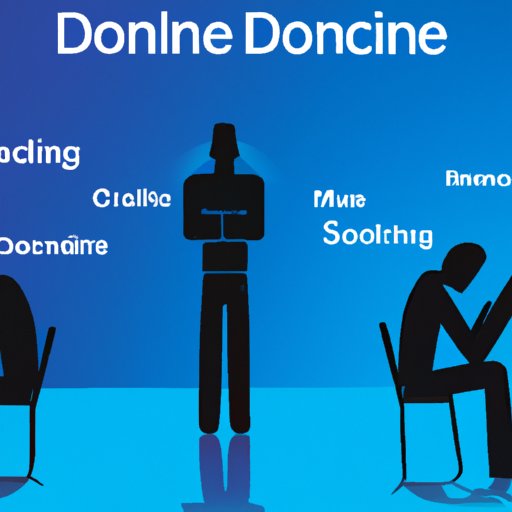Introduction
Technology has become a pervasive part of our lives, from smartphones and laptops to smart TVs and home assistants. But how has this increased reliance on technology impacted our relationships with others? Does technology make us more alone? In this article, we will explore the pros and cons of technology use, looking at how it can both reduce and enhance loneliness.

Analyzing the Impact of Technology on Human Connection
Technology has had a significant impact on the way we interact with others. Thanks to advances in communication technology, it is now easier than ever to stay connected with friends and family, even when they are far away. As technology expert Dr. Paul Levinson notes: “We can communicate with people anywhere in the world, almost instantaneously, and that’s something that was impossible even a few decades ago.”
However, there are also potential downsides to relying too heavily on technology for communication. Studies have found that excessive use of technology can lead to feelings of loneliness and depression, as well as an increased risk of anxiety and stress. Additionally, technology can limit physical human interactions, leading to fewer face-to-face conversations and reduced opportunities for meaningful connection.
Exploring How Social Media Platforms Help and Hinder Human Interaction
Social media platforms such as Facebook, Instagram, and Twitter have revolutionized the way we connect with others. These platforms offer users the opportunity to stay in touch with friends and family, share photos and videos, and join online groups and communities. According to one study, social media use can even have a positive effect on mental health, reducing feelings of loneliness and isolation.
However, there are also potential dangers associated with relying too much on social media for connection. For example, studies have found that spending too much time on social media can lead to feelings of inadequacy and insecurity, as users compare themselves to others. Additionally, research suggests that heavy social media use can lead to increased levels of depression and anxiety.
Furthermore, social media can be a source of distraction, pulling us away from real-life conversations and activities. As psychologist Dr. Jean Twenge notes, “When you’re constantly checking your phone, or you’re so busy interacting with people online, you may be missing out on the face-to-face conversations that are really important for forming strong relationships.”

Examining the Pros and Cons of Spending Too Much Time Online
Spending time online has its advantages, from accessing information and resources to connecting with like-minded individuals. However, there are also potential risks associated with spending too much time online, such as cyberbullying and online addiction. Additionally, research suggests that excessive internet use can lead to feelings of loneliness, as well as a decrease in overall happiness and satisfaction with life.
Investigating the Role of Technology in Reducing or Enhancing Loneliness
Despite the potential pitfalls of technology use, it can also be used to reduce loneliness and foster meaningful connections. For example, many people use video-chatting apps such as Skype and FaceTime to stay in touch with friends and family who live far away. Additionally, technology can help bring people together by facilitating group activities such as virtual game nights or book clubs.
However, technology can also have the opposite effect, making us feel even more isolated and disconnected from others. According to one study, people who spend a lot of time playing video games or browsing the internet are more likely to experience loneliness than those who do not. Furthermore, technology can be a source of distraction, leading us away from real-life conversations and activities.

Looking at How Technology Can Enhance Our Relationships with Others
In addition to reducing loneliness, technology can also be used to enhance our relationships with others. For example, many couples use technology to stay connected, sharing photos and videos and sending sweet messages to one another. Additionally, technology can be used to create new relationships, from joining online forums and discussion groups to meeting new people through dating apps.
However, it is important to remember that technology should not replace real-life interactions. Studies have found that too much technology use can lead to a decrease in empathy and emotional intelligence, as well as a decrease in overall relationship satisfaction. Additionally, relying too heavily on technology can lead to a lack of meaningful conversation and connection.
Conclusion
In conclusion, technology can both reduce and enhance loneliness. While it can provide us with access to information and resources and facilitate meaningful connections, it can also lead to feelings of isolation and disconnection. It is important to remember that technology should not replace real-life interactions, and that it should be used in moderation. By using technology responsibly and cultivating real-life relationships, we can foster meaningful connections and reduce loneliness.
(Note: Is this article not meeting your expectations? Do you have knowledge or insights to share? Unlock new opportunities and expand your reach by joining our authors team. Click Registration to join us and share your expertise with our readers.)
